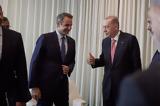Greece Ties EU Defense Cooperation with Turkey to Policy Shift on Casus Belli
Greek Prime Minister Kyriakos Mitsotakis has announced his intention to formally request that Turkish President Recep Tayyip Erdogan revoke Turkey’s longstanding casus belli—a declaration that considers a potential extension of
The move, he said, is essential for fostering greater cooperation between Athens and Ankara and for enabling Turkey’s potential participation in European defense initiatives.
In an interview with SKAI radio on Thursday, Mitsotakis stressed the importance of consensus within the European Union when it comes to defense policy. “For the EU to sign any defense agreement with a third country, unanimous approval from all member states is required,” he explained. This unanimity, he implied, gives Greece a significant role in shaping how and when countries like Turkey are allowed to engage with European defense programs.
While Mitsotakis acknowledged that Greece is open to exploring such partnerships, he made clear that any deepening of Turkey’s involvement in European security projects would need to reflect Greek strategic concerns. Chief among them is the casus belli, a point of friction in Greek-Turkish relations since the Turkish parliament adopted it in 1995 in response to Greece’s stated right—under international law—to extend its territorial waters from six to twelve nautical miles.
“If Turkey wants to join European defense programs, it must address our concerns. We will ask our Turkish friends to withdraw the casus belli after 30 years,” Mitsotakis said. “I will raise the issue directly with President Erdogan.”
The Greek premier’s remarks come ahead of the next High-Level Cooperation Council between the two countries, a bilateral summit that Mitsotakis confirmed will take place in the coming months, though exact dates have yet to be finalized. “We are looking for possible dates. These meetings are important. We must keep communication channels open,” he noted, framing dialogue as a necessary step toward stability in the region.
Mitsotakis also dismissed the notion that specific joint projects—such as the proposed undersea electricity cable linking Greece and Israel—have been indefinitely postponed. The energy interconnection, part of a broader vision to strengthen regional energy cooperation has faced delays amid diplomatic tensions. But Mitsotakis insisted the plan is still very much on the table. “It is wrong to assume that the power cable has been shelved,” he said.
#ENGLISH_EDITION #TURKEY- Δημοφιλέστερες Ειδήσεις Κατηγορίας Ειδήσεις
- Γιώργος Λιάγκας: Σοβαρό τροχαίο ατύχημα για τον παρουσιαστή
- Disney: Οι Avengers μπορούν να περιμένουν
- Συναγερμός στη Μυτιλήνη: Εξαφανίστηκε με το αυτοκίνητό της
- Γιώργος Λιάγκας: Τροχαίο ατύχημα για τον παρουσιαστή
- Βρέθηκε η «Ατλαντίδα της Ερήμου»; – Κρυμμένη πόλη 5.000 ετών κάτω από την άμμο
- Σε εξέλιξη η φωτιά στο Μαρκόπουλο: Κοντά στο Ναό της Παναγίας Βαραμπά οι φλόγες
- Φριχτή κακοποίηση παιδιών στη Λάρισα – Μπαλάσκας: Η αστυνομία ερευνά το ενδεχόμενο η μητέρα να εκδιδόταν
- Ιαπωνία: Ένας 25χρονος στράβωσε τον αυχένα του επειδή χρησιμοποιούσε για χρόνια σκυφτός το κινητό του
- Ισραήλ: «Έχετε σκοτώσει 19.000 παιδιά» – Πήραν σηκωτό βουλευτή που μίλησε για τη Γάζα
- Κ. Χατζηδάκης: Άρση μονιμότητας και μπόνους στο Δημόσιο μετά από πραγματική αξιολόγηση
- Δημοφιλέστερες Ειδήσεις Dikaiologitika
- Γιατί επιστρέφει στα μετρητά η Ευρώπη; Φόβοι για μπλακάουτ στις ηλεκτρονικές πληρωμές
- Final Four 2025: Ερωτηματικό ο Λεσόρ από τον Παναθηναϊκό στον αγώνα με την Φενέρ στο Άμπου Ντάμπι
- Βάνα Μπάρμπα: Το μήνυμα στη Σταματίνα Τσιμτσιλή μέσα από το νοσοκομείο
- Άρση μονιμότητας στο Δημόσιο: Χωρίς μισθολογικά κίνητρα θα αποτύχει
- «Τα σπάνε» ΣΥΡΙΖΑ-Νέα Αριστερά για την Προανακριτική
- Greece Ties EU Defense Cooperation with Turkey to Policy Shift on Casus Belli

- Τελευταία Νέα Dikaiologitika
- Greece Ties EU Defense Cooperation with Turkey to Policy Shift on Casus Belli
- «Τα σπάνε» ΣΥΡΙΖΑ-Νέα Αριστερά για την Προανακριτική
- Final Four 2025: Ερωτηματικό ο Λεσόρ από τον Παναθηναϊκό στον αγώνα με την Φενέρ στο Άμπου Ντάμπι
- Βάνα Μπάρμπα: Το μήνυμα στη Σταματίνα Τσιμτσιλή μέσα από το νοσοκομείο
- Γιατί επιστρέφει στα μετρητά η Ευρώπη; Φόβοι για μπλακάουτ στις ηλεκτρονικές πληρωμές
- Άρση μονιμότητας στο Δημόσιο: Χωρίς μισθολογικά κίνητρα θα αποτύχει
- Κοντιάδης στο Dnews: Αρση ποιας μονιμότητας και με ποιους όρους; Ένα δείγμα αναθεωρητικού λαϊκισμού
- Φονικές πλημμύρες στην Αυστραλία: 4 νεκροί, 50.000 εγκλωβισμένοι - Σε 3 μέρες έπεσε νερό 6 μηνών (Βίντεο)
- Τελευταία Νέα Κατηγορίας Ειδήσεις
- Απίστευτο περιστατικό σε χωριό στη Λάρισα – Τσακώθηκαν και του έκοψε κομμάτι από το αυτί
- O Λαβρόφ απέκλεισε συνομιλίες για το ουκρανικό στο Βατικανό - Μίλησε για «χούντα Ζελένσκι»
- Καλλιεργούσαν κάνναβη σε σπίτι στη Χαλκιδική – Τι βρέθηκε από την έρευνα
- Τουρκία: 44 νέες συλλήψεις για διαφθορά – Χειροπέδες και στην ιδιαιτέρα του Εκρέμ Ιμάμογλου
- Φωτιά στο Μαρκόπουλο – «Σηκώθηκε» ελικόπτερο
- Λέκκας: Απαράδεκτοι οι ισχυρισμοί ότι κρύψαμε το μέγεθος του σεισμού στην Κρήτη
- Συναγερμός στη Μυτιλήνη: Εξαφανίστηκε με το αυτοκίνητό της
- Ινστιτούτο Αλέξη Τσίπρα: Στους συντελεστές του ισραηλινοπαλαιστινιακού «No Other Land» το Βραβείο Ειρήνης Πρεσπών



